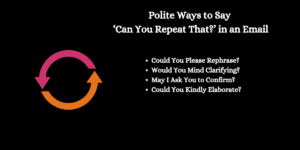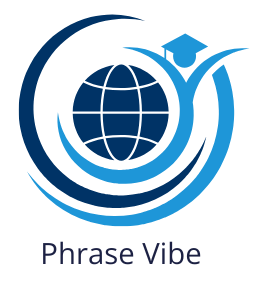When communicating via email, there are many situations where you might need to ask someone to repeat information. It’s not uncommon, especially during a business meeting or an online lesson. Using the old phrase “Can you repeat that?” can sometimes sound too direct or even slightly aggressive. Instead, try polite alternatives that fit a professional tone. For example, you could say, “Could you please clarify this point?” or “I didn’t quite catch that, could you go over it again?” These expressions show respect and keep the conversation smooth.
Many English courses still teach old-fashioned phrases like “Excuse me?” or “Pardon?”, which may not be suitable in all contexts. When you don’t hear the other person well, especially during talking or taking notes, consider using different ways to ask, such as “I’m afraid I missed that part, could you explain again?” Whether you’re messaging a friend or a colleague, these nine simple phrases will help you stay clear and polite, even during those times when the conversation needs a little repetition.
Key Points for Politely Asking for Repetition in an Email
- Use Polite Phrases: Instead of directly saying “repeat,” try using softer phrases like “Could you clarify?” or “Would you mind elaborating?” This approach makes your request sound respectful.
- Preface Your Request: Add a phrase like “I want to ensure I understood clearly.” This helps acknowledge any confusion and makes the recipient feel that you are seeking clarity, not challenging their message.
- Soften the Tone: Using words like “please” or “may I ask” softens your request. It helps to show that you are not demanding a repetition but simply asking for a better understanding.
- Acknowledge Uncertainty: Mentioning that you’re “not sure” or “want to be clear” shows humility and helps the other person feel more comfortable providing clarification without feeling pressured.
- Focus on Clarity, Not Repetition: Instead of saying “repeat,” ask for a bit more detail or elaboration. This way, it sounds like you are seeking clarification, which can be more effective in professional communication.

List of Polite Ways to Say ‘Can You Repeat That?’ in an Email
- Could You Please Rephrase?
- Would You Mind Clarifying?
- May I Ask You to Confirm?
- Could You Kindly Elaborate?
- I Didn’t Catch That, Could You Repeat?
- Can You Re-State the Point?
- Could You Provide More Details?
- May I Double-Check for Understanding?
- I Apologize, Could You Go Over That Again?
- Could You Re-Explain the Previous Statement?
- Sorry for the inconvenience, Could You Repeat That?
- Kindly Provide the Information Again.
- I Didn’t Hear That Clearly, Could You Say It Again?
- May I Ask You to Speak Clearer?
- I Apologize, I Didn’t Understand What You Said.
- Could You Keep It Simple and Re-Explain the Following?
- May I Ask for a Better Explanation of What You Mentioned?
You Might Like To Read Creative Ways to Say “Your Cooperation is Much Appreciated
Could You Please Rephrase?
This phrase politely requests the sender to explain their message again in different words. It shows you didn’t understand the main points but want clarity without causing any inconvenience.
Example:
“Apologies for the confusion. Could you please rephrase the part about the upcoming project? Thank you for your help.”
Would You Mind Clarifying?
This phrase is a gentle way to ask for more details. It shows that you want to understand better without sounding demanding or rude.
Example:
“Would you mind clarifying that last point? I want to make sure I got it right.”
May I Ask You to Confirm?
This phrase is a polite request to double-check information. Asking the sender to confirm key details helps ensure you understand correctly.
Example:
“May I ask you to confirm the status of my query? Please see the details restated below for your reference.”
Could You Kindly Elaborate?
This phrase is a respectful way to request more details or a deeper explanation. It shows interest and a need for more clarity.
Example:
“Could you kindly elaborate on that point? I’d appreciate a bit more information.”
I Didn’t Catch That, Could You Repeat?
This phrase is a polite way to admit you didn’t catch the information and respectfully asks the sender to repeat it. It’s helpful for ensuring clear comprehension, especially if details were missed during a voicemail or a client meeting.
Example:
“Sorry, I didn’t quite grasp the last part about the date, time, and location. Could you repeat that? Kindly, let me know. Best regards, Michael.”
You Might Like To Read Alternative Ways to Say ‘Yes’ in English
Can You Re-State the Point?
This phrase politely requests the sender to re-state or rephrase the information. It admits that you didn’t hear or fully understand what was previously mentioned, especially during a phone call.
Example:
“Apologies for any inconvenience. May I ask you to re-state the main points about the upcoming project? Thank you for your patience. Best regards, David.”
Could You Provide More Details?
This phrase humbly requests the sender for more details and an additional explanation to gain better understanding. It’s useful when something is not clear in an email.
Example:
“Could you provide more details about the upcoming marketing campaign? I’d appreciate a clearer understanding of the target audience and key objectives.”
May I Double-Check for Understanding?
This phrase humbly requests to double-check the information and acknowledges a need for clarity. It shows that you value accuracy and want to confirm your understanding.
Example:
“May I double-check for understanding? I’d appreciate it if you could provide additional details on the upcoming marketing campaign, specifically the target audience and key objectives.”
I Apologize, Could You Go Over That Again?
This easy phrase acknowledges the difficulty in hearing or understanding and politely asks the sender to repeat the information. It’s useful when you don’t fully grasp what was mentioned, especially during a call.
Example:
“I apologize, but could you go over that again? I didn’t catch the last part clearly. Thank you for your patience, Cena.”
Could You Re-Explain the Previous Statement?
This phrase politely asks the sender to re-explain their previous statement without causing offense. It’s a respectful way to request a repeat for clarity.
Example:
“Dear Emily, could you re-explain the previous statement? I just want to ensure I have all the details accurately. Thank you for your understanding.”
Sorry for the inconvenience, Could You Repeat That?
This phrase apologizes for any trouble caused and politely asks the sender to repeat the information for better comprehension. It’s useful when you need clarity on specific details.
Example:
“Sorry for the inconvenience, but could you repeat the updated budget figures? I need to ensure I have the correct numbers discussed in the meeting. Thank you for your understanding, Robert.”
Kindly Provide the Information Again
This phrase politely asks the sender to provide the information again, acknowledging the need for clarity without causing offense. It’s a courteous way to request a repeat of important details.
Example:
“Sorry for the trouble, could you kindly provide the information again? I need clarity on the updated budget figures discussed in the meeting. Thank you
You Might Like To Read Alternative Ways to Say “Please Let Me Know if This Works for You”
I Didn’t Hear That Clearly, Could You Say It Again?
This phrase acknowledges difficulty in hearing and politely asks the sender to say it again. It’s respectful and shows you want to make sure you fully understood.
Example:
“Sorry, I didn’t hear that clearly. Could you say it again, please? I want to ensure I got the information right from the call
May I Ask You to Speak Clearer?
This phrase requests the sender to adjust their speaking for better clarity. It helps ensure the information is communicated clearly without causing any inconvenience.
Example:
“Apologies for the difficulty, but may I ask you to speak clearer during the next part of the presentation? It will aid in better understanding. Thank you, Sarah.”
I Apologize, I Didn’t Understand What You Said
This phrase expresses that you didn’t fully grasp the information and respectfully asks the sender to repeat it for clear comprehension. It’s polite and shows attentiveness.
Example:
“I apologize, but I didn’t understand what you said. Could you kindly repeat the details about the client meeting—specifically the date, time, and location? Thank you and best regards, Michael.”
Could You Keep It Simple and Re-Explain the Following?
This phrase politely asks the sender to keep it simple and re-explain, making it easier to understand. It shows appreciation for clarity.
Example:
“Could you keep it simple and re-explain the following points? I’d really appreciate it if you could go over them again briefly.”
May I Ask for a Better Explanation of What You Mentioned?
This phrase is a polite way to request more clarity. It shows that you value the sender’s input but need a simpler or clearer explanation.
Example:
“May I ask for a better explanation of what you mentioned earlier? I’d appreciate it if you could clarify it a bit more for better understanding.”
You Might Like To Read Unique Ways to Say “Happy Friday”
